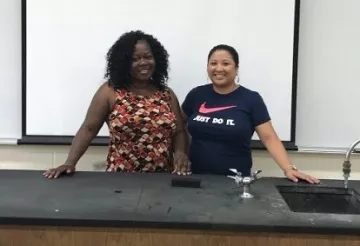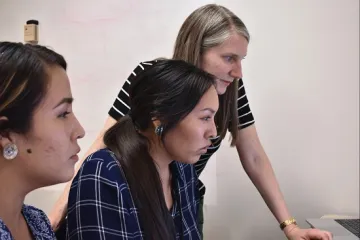Special Women’s History Month guest blog from Rebecca Medina, Director of the Science and Technology Directorate’s (S&T) Office of University Programs, looks at research and development efforts driven by some of our remarkable academic partners.

Throughout March, we have reflected on the impressive contributions of women across S&T in blogs spotlighting our national laboratories and our women-owned business partners. Now that the spotlight has been passed on to me, I wanted to use this space to share my incredible privilege to work with women in various positions across America’s colleges and universities who strive to advance our shared mission to make the country and its people more secure. These amazing women are conducting cutting-edge research on topics from enhancing community resiliency to counterterrorism, emergency management, cybersecurity, aviation and maritime security…and much, much more.
I am honored that I was asked to highlight a sampling of the many innovative women we are collaborating with through the DHS Centers of Excellence (COEs), as well as through our association with the nation’s Minority Serving Institutions (MSI). Their achievements will help to foster future STEM leaders for generations to come.

Dr. Camellia Okpodu and Raisa Barrera, a faculty-student team, were awarded an MSI Summer Research Team (SRT) (PDF, 3MB, 2pgs.) award to investigate coastal resilience in response to sea level change. Okpodu and Barrera worked in coordination with Old Dominion University’s Resilience Collaborative, part of the Coastal Resilience Center (CRC), a DHS COE led by the University of North Carolina at Chapel Hill. They also identified epigenetic markers in sea grasses that may change in response to soil salinity. These markers can serve as early identifiers for plants that would be more adaptive to sea level change.
Dr. Meherun Laiju, professor at Tougaloo College in Mississippi, a Historically Black College and University, also works with CRC. Laiju created the first-of-its-kind Disaster and Coastal Studies interdisciplinary minor degree program and disaster certificate program at Tougaloo. Students supported by this curriculum have taken what they learned to federal, state and local positions around the country.
Dr. Gina Ligon serves as the Director of the National Counterterrorism, Innovation, Technology, and Education Center (NCITE), a DHS COE led by the University of Nebraska Omaha. Ligon was in high school during the Oklahoma City bombing and visited the site the next day—an experience that sparked her passion to work in counterterrorism studies. Currently, Dr. Ligon oversees more than 50 academics from 19 universities supporting homeland security enterprise counterterrorism missions with user-inspired projects dedicated to terrorism prevention and emerging threat awareness. During NCITE's first two years, the center launched research and education projects across its consortium of academic partners becoming an important resource for the government, contributing to a first-ever White House domestic terrorism strategy and policy.
Dr. Erin Chiou and Dr. Mickey Mancenido are working with the Center for Accelerating Operational Efficiency, a DHS COE led by Arizona State University, on a project that will test the capability of a new tool to effectively measure the trustworthiness of AI systems. The tool, called the Multisource AI Scorecard Table, is based on a set of standards originally developed to evaluate the trustworthiness of human-written intelligence reports. It uses a set of nine criteria, including describing the credibility of sources, communicating uncertainties, making logical arguments and giving accurate assessments.

Dr. Sara Kien, Ashley Lee, and Tatyanna Begay are another SRT faculty-student team that worked with the Criminal Investigation and Network Analysis (CINA) Center led by George Mason University. The team researched impacts of cyber communications on public perception and reactions to mass shootings. Their goal was to identify factors that indicated the spread of violent crime. Through their research, the team discovered a statistically significant correlation between expressions of anger and the reporting of mass shootings.
I am continually inspired, both personally and professionally, to work alongside these women and the many more affiliated with all nine DHS COEs. As we wind down our celebration of Women’s History Month, we commit to recognizing each of the invaluable academic colleagues working alongside S&T to push the research and development envelope forward, ensuring that we (and the nation) continue to benefit from advances in science and technology.
